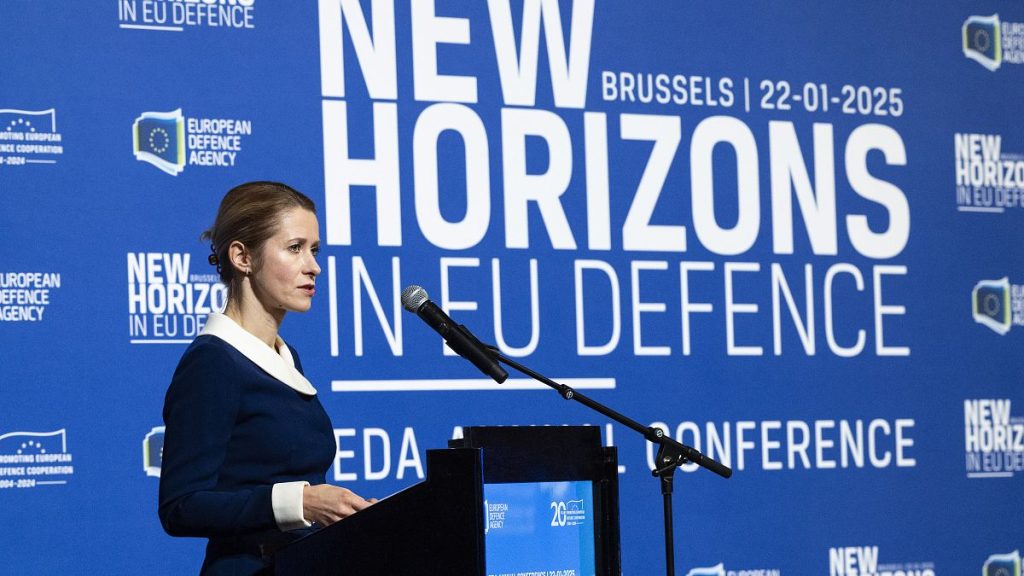Paragraph 1: The Urgent Need for Increased European Defense Spending
The European Union faces a critical juncture in its security landscape, necessitating a significant boost in defense spending to counter the growing threat posed by a resurgent Russia. Kaja Kallas, the EU’s top diplomat, has sounded the alarm, emphasizing the need for the EU to "prepare for the worst" and develop the capacity to defend itself independently if necessary. Intelligence assessments suggest that Russia could test the EU’s defense capabilities within the next three to five years, highlighting the urgency of the situation. This looming threat is compounded by Russia’s superior production capacity for weapons and ammunition, outpacing the EU’s collective output by a significant margin. Kallas underscored the stark reality that Russia can produce more weaponry in three months than the entire 27-country bloc can in a year. This disparity in production capacity underscores the vulnerability of the EU and the urgent need to bolster its defense industrial base.
Paragraph 2: Bridging the Defense Spending Gap
The EU currently dedicates a meager portion of its resources to defense, falling far short of what is required to address the evolving security challenges. Estimates suggest that the EU will require at least €500 billion in defense investments over the next decade to remain competitive. However, only a fraction of this amount, approximately €13 billion, has been allocated for defense and security in the EU’s long-term budget from 2021 to 2027, representing a paltry 1.2% of the total budget. This stark contrast between need and allocation highlights the significant gap in defense funding. Kallas stressed the need for a multi-faceted approach to bridge this gap, advocating for increased investment from member states, the private sector, and the common European budget. She urged for defense spending to exceed 1% of the bloc’s GDP, significantly higher than the current level.
Paragraph 3: Comparing Defense Spending and the Russian Threat
The disparity in defense spending between the EU and Russia further emphasizes the urgency of the situation. In 2024, EU member states collectively spent an average of 1.9% of their GDP on defense, while Russia allocated a staggering 9% of its GDP to military expenditures. This significant difference highlights the vast gap in resource allocation and underscores Russia’s prioritization of military power. While some member states, like Lithuania, are taking steps to significantly increase their defense budgets in response to Russian aggression, others, including larger economies like Italy and Spain, are still falling short of the NATO target of 2% of GDP. Kallas emphasized that defense requires significant investment of money, skilled personnel, and time, highlighting the need for urgent action given the limited time available to strengthen European defenses.
Paragraph 4: The Need for Interoperable European Armies and Transatlantic Cooperation
Kallas advocated for strengthening individual member states’ armies rather than creating a unified European army. The emphasis is on building 27 capable and interoperable national forces that can effectively collaborate to deter adversaries and defend Europe, preferably in conjunction with allies but independently if necessary. This approach recognizes the sovereignty of individual member states while emphasizing the crucial need for coordinated action and interoperability. Concerns over European dependence on the US for security have also been raised by French President Emmanuel Macron, who urged Europe to "wake up" and increase its defense spending to reduce this reliance. This call for greater European self-sufficiency in defense reflects a growing awareness of the need for strategic autonomy in a changing geopolitical landscape.
Paragraph 5: The Price of Security and the Importance of Collective Action
The increased investment in defense will require financial sacrifices from European citizens, potentially impacting areas like pensions, healthcare, and social security. This acknowledgment by leaders like Mark Rutte highlights the serious commitment required to address the long-term security challenges facing Europe. While NATO Secretary General Jens Stoltenberg acknowledges that there is no immediate threat to allies, he also emphasizes that the danger is rapidly approaching, characterizing the current situation as neither war nor peace. This underscores the need for proactive measures to bolster defenses and deter potential aggression. The emphasis on collective action is echoed by Andrius Kubilius, the European Commissioner for Defence and Space, who advocates for a "Big Bang approach" to increase defense production and acquisition, moving away from fragmented efforts towards a more integrated and efficient model.
Paragraph 6: A Call for European Responsibility and Transatlantic Partnership
The EU’s message to the US is clear: Europe must take greater responsibility for its own defense and share the burden of ensuring European security. This reflects a growing consensus within the EU that a stronger European defense posture is essential for transatlantic stability. Kallas’ call for increased defense spending, coupled with calls for greater European strategic autonomy, highlights a shifting dynamic in the transatlantic relationship, with Europe seeking to become a more capable and self-reliant security partner. The emphasis on interoperable weapon systems, aggregated demand for the defense industry, and joint projects like the air and cyber defense shields and the Northern and Eastern Border Initiative demonstrates the EU’s commitment to building a more robust and cohesive defense architecture. This collective approach aims to enhance Europe’s preparedness for military and hybrid threats, contributing to a more secure and stable transatlantic partnership.














